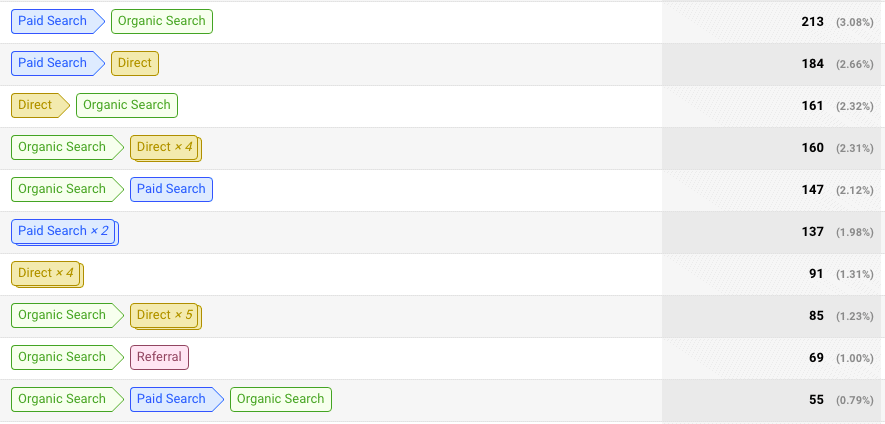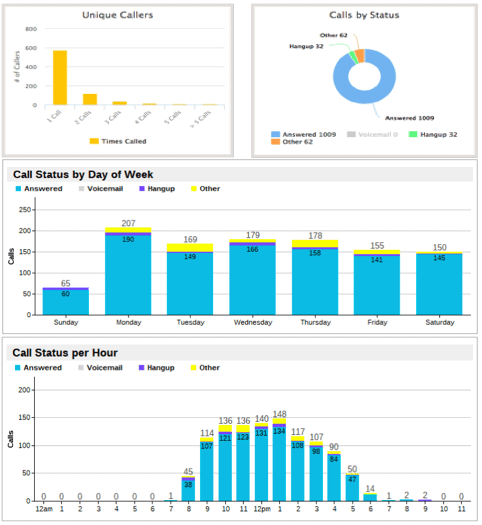A powerful tool that often gets overlooked in digital marketing campaigns is Tracking. Tracking allows you to see how your audience interacts with your advertising efforts, and allows you to measure your digital marketing effectiveness. It helps you gather relevant data for your business. Keep in mind that tracking is only useful when it’s aligned with your business objectives – and when it is, it’s an effective way to discern what moves the needle for your company. There are 5 types of tracking channels required to build the most impactful tracking strategy; Google Analytics, Phone Call Tracking, Conversion Tracking, and tracking the success of your Key Performance Indicators (KPIs). In addition to these tracking channels, it’s imperative to invest in a Marketing Software or Data Platform to compile the information and map your customer’s journey; from expressing interest in your brand to actually purchasing your product or service.
1. Google Analytics
This is a free software that allows you to capture website activity. Who is looking for you? What are people looking for when they come across your business? Where did potential customers find your website? These are questions that Google Analytics can help you answer. You also have the ability to track custom conversion goals; whether you’re an e-commerce site or personal injury attorney, you need to see who is taking action on your site. Another piece of information you can track, and probably one of the most important, is Attribution. Attribution can reveal what path a customer took to get to your site and engage with your business once they’re there.

2. Call Tracking
The ability to separate out customers who found you from a digital ad helps you place an actual value for ROI on your marketing dollars. Recorded phone calls help you determine who is calling and where the calls are originating from; a Google Search ad, YouTube, Facebook ad, etc. You can also hear why they are calling; how many of these calls are potential leads, and what your conversion rate is that’s connected to these phone calls. This is all valuable information and insight, and can be set up for a mere $25/month. Money well spent.

3. Conversion Tracking
Most of the major digital platforms have some sort of conversion tracking. One way you can measure digital marketing effectiveness is through conversions tracking, which can include form submissions, product purchases, downloading content, and so on. Placing a tracking code to track when these events take place gives you more fuel when it comes to managing your campaigns.
4. Marketing Software / Data Platform
A marketing management software allows you to compile all of the data mentioned above, creating a place for the information to exist and making it more digestible and useful when trying to measure your digital marketing effectiveness. Seeing how your customers find you; to seeing them complete an action on your site (for submission, purchase, etc) is really what Tracking is all about. Investing in a Data Platform enables you to predict, and keep up with, the ever-changing consumer journey.
5. KPI Tracking
Since every business is different and no marketing goals are the same, you need to set KPIs. Ask yourself; ‘how do the previous 4 items line up with my Key Performance Indicators?’ Once you’ve gathered all the data from these 4 items, you will understand your KPIs and be able to determine what is and what isn’t working in your digital marketing campaigns.
At its core, monitoring and tracking your marketing campaigns is measuring performance against your business objectives, and understanding what is working and what isn’t. In today’s ever-changing landscape of digital marketing, staying competitive is paramount; and your tracking strategies are a key piece of any marketing efforts you implement. Access to relevant data & analytics through these tracking strategies will reveal how your targeted consumers are engaging with you and showcase what messaging has the most impact. As a business owner, the information that you can glean from tracking is essential in determining how to move forward in your campaigns. Regardless of your industry or business type, these five tracking methods are an important tool to grow your business.





 8055 E Tufts Ave Ste 240
8055 E Tufts Ave Ste 240




